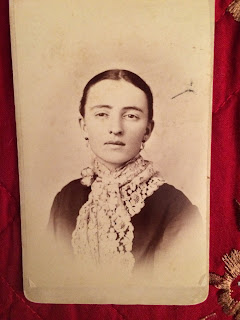Our son Seth at Disneyland, 2012
When I am in Kentucky, I am working on a project to gather and make public the stories of the people of color in a small town. In order to do this, I'm working hand-in-hand with a woman who grew up in the African American community, and who is deeply entwined in their history. She asked me to work with her. In my mind, and in my heart, I know that I am using the skills I have gleaned as a minister, as a writer, and as a spiritual director, to be present with people, to draw out and treasure their tales, and to bring them cohesively into what I pray will be a narrative that is both an agent of change and an agent of healing for a still-marginalized and very much oppressed minority.
This is in addition to the work that the interim congregation I am serving in New Jersey has done by posting a Black Lives Matter sign, and starting a partnership/lecture series with a Black United Methodist congregation in Atlantic City. So, many of my waking hours are devoted to the issues of Black Lives, which have become, in my eyes, the issues of the day.
Residents of Atlantic City & Atlantic County share stories on Black Lives
Why did I put the white guy in the center!?
But I perpetually question my own motives. What part of this is about me, and my need to feel useful, to feel that somehow I am doing something to stand against the forces of racism and discrimination that still exist across this land? Worst of all, do I fall into the category of the "white Saviour?"
During the week before the MLK holiday, I was at home in Kentucky, and when there, I often attend the town's AME Zion chapel. The pastor, a woman, has agreed to collaborate in the project, as well as to allow the photographer I've asked to potentially work with us to take some photos during a service. I have felt both blessed and somewhat surprised at their welcome for me. Let's just say that were I a person of color in a small town that felt as if it were about 1975 today, I'd question the motives of a white woman coming in from outside to "write a book or a documentary.." Enough said.
"Oh, NO! I am centering myself. " (White savior anxiety)
Last time I went there, I spoke with a woman from the community I'd known for a few years, and met her son, who is 11. On the way to school the next day, I mentioned to Seth, who, because of his Autism, doesn't get a lot of play dates, that maybe the two could play together sometime. At first he thought I was talking about the congregation I am serving in New Jersey. No, I said, the African American church we went to. To which he responded: I thought Martin Luther King fixed that a long time ago. I stammered something, and he added: What? Did the white people forget?
Indeed the correct answer here is "Yes. The white people did forget." And that includes those of us, liberals and progressives, who, whether because of our preoccupation with other matters or, and I will freely admit that I fall into this category, because of our fear of being looked upon with mistrust and even scorn, of being seen as or even actually being that "white savior" mentioned in articles like this one from Huffington Post or this one, from the Atlantic, just quietly stepped away from working on matters of racism.
Second attack on sign. Since this one, it was painted over again.
The reality is that some of us dedicated our ministry to anti-racism decades ago. We are not looking to be "saviors" or to win awards. We are compelled to join the struggle because to do otherwise would be to live a life of such compromise that we would feel, especially now, that a new Civil Rights movement has begun in full bloom, utterly hypocritical.
Unified Black Students of Stockton Rally November 2015.
James W. Perkinson, in White Theology: Outing Supremacy in Modernity, argues persuasively and eloquently that white solidarity must be born of not only conviction but of pedagogy and struggle. He also states that white solidarity, to be genuine, must be embodied in what he calls "the sacrament of a post white vocation.." a kind of Baptism. For white people, the functional equivalent of such a "baptismal" reprogramming is a life-long self-discipline and self-confrontation in the existential schools of racial encounter, inculcating a different habit of perception, able to see and feel the significance of the entire system of supremacy that bears down with such intransigent weight...Before there can be cognition of a new possibility, there is need for a newly felt consternation inside "the problem." The problem is a code of absolute differentiation habituated deep inside the white body that requires sustained confrontation and interior work. (Perkinson, 245)
So, while I have to check in with my colleagues who are also active in this movement, while I need to examine my own motives and my own actions, I also need to trust my heart, stay true to my convictions. I need to listen to and read the voices that affirm my passion. In fact, I should have done that long ago.
My great grandmother, Mora Lake Patton. Cherokee Indian. I think of her sometimes. She died in childbirth.





